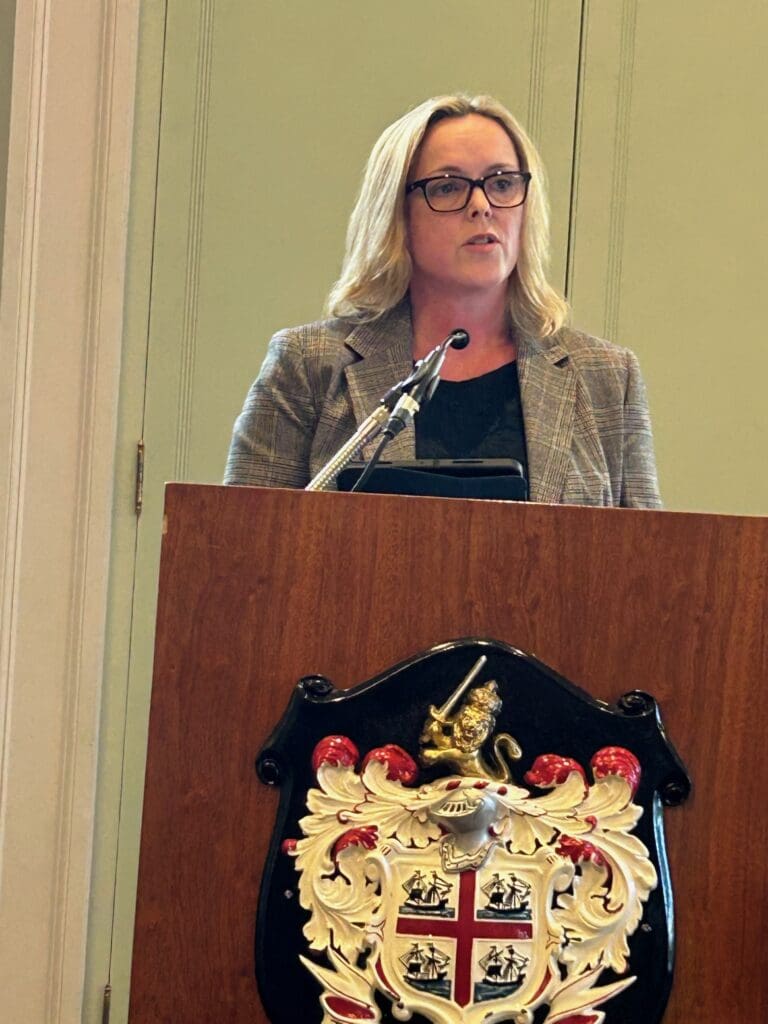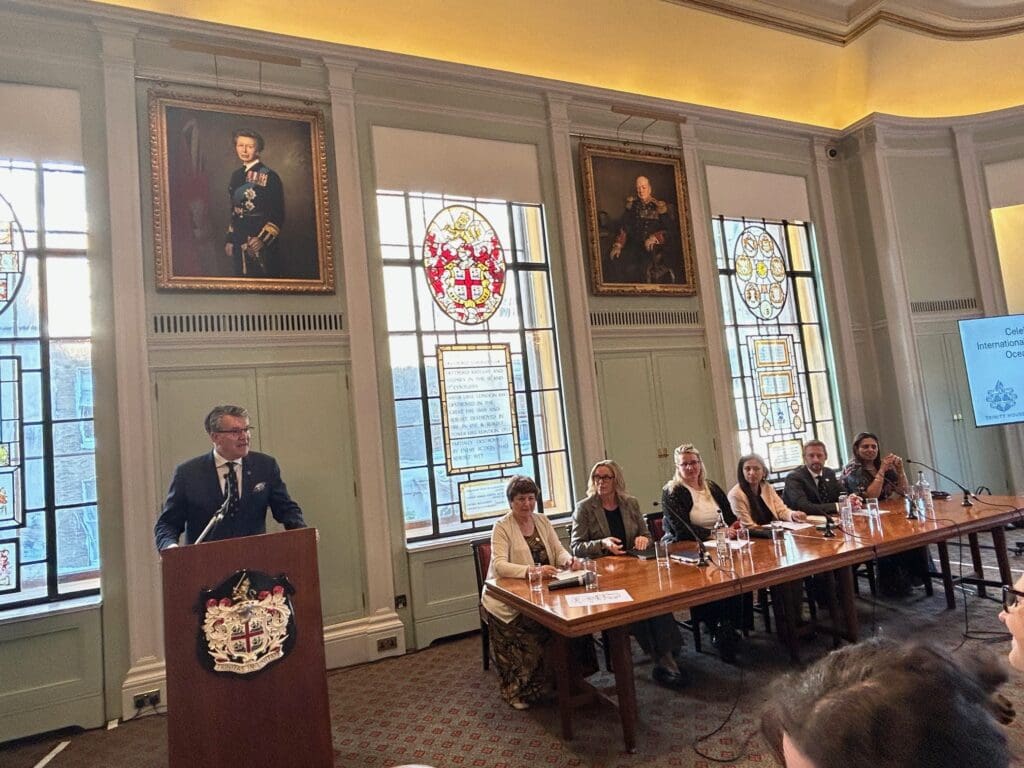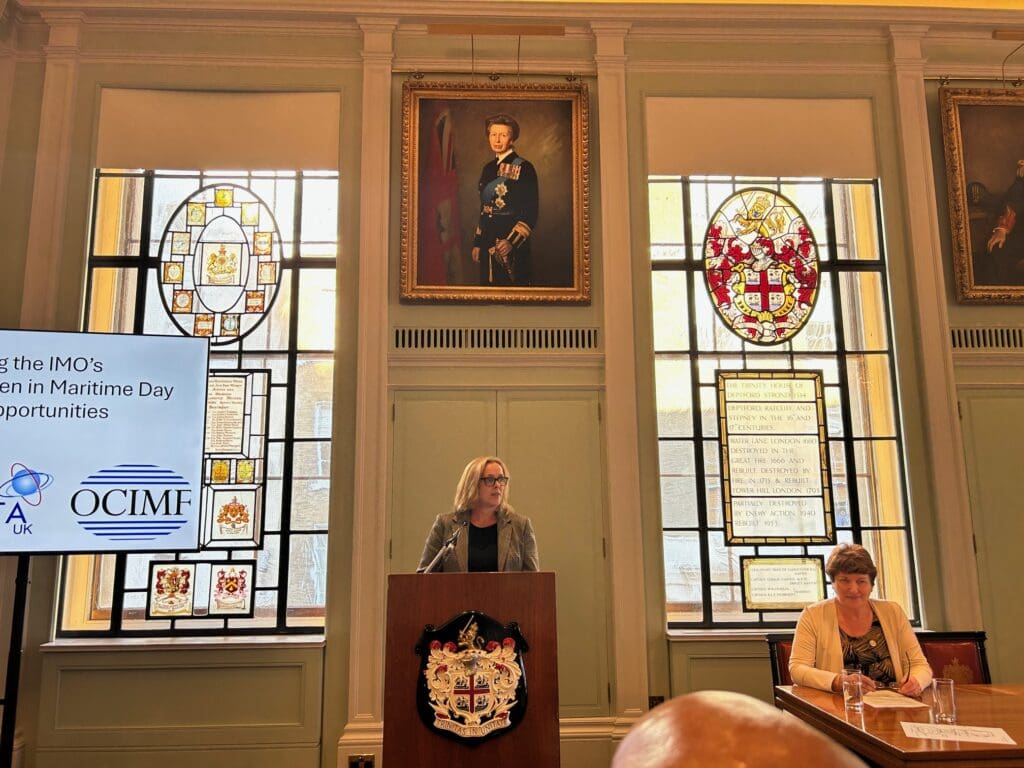
Just before Friday’s event on International Women in Maritime Day at the IMO HQs this coming Friday, we had on the 13 May 2025 a unique event at the iconic Trinity House with an excellent panel of speakers – see picture below, and will revert with the brief write up of the event soon. Here below we bring you verbatim the keynote speech by Sarah Kenny, BMT’s CEO. She was warmly applauded by the 200 strong audience:
Good afternoon everyone,
I am delighted to be here today, to kick off what promises to be a really interesting and insightful set of presentations and discussions, focussed on a topic that is very dear to me – women in maritime – and how we capitalise on the ‘Ocean of Opportunity’ ahead of us! I would like to thank WISTA, our sponsors OCIMF, and of course our hosts today Trinity House for having both the foresight to make today happen, and of course for providing the logistics
and venue!
I am going to set the scene for this evening’s event by setting out what I see as the key factors that will influence the shape of the maritime sector in the coming decade. I propose that there are three:
Firstly, Significant growth in global maritime trade – to a value of up to $3 trillion by 2030 according to the OECD – and with it, increasing demand for shipping and the ecosystem of people and services that support it.
Secondly, In our increasingly contested global trading environment, growth in intra-regional and intra-national sea trade will potentially open up new sea routes and make the need for short-sea shipping more pressing than it has been to date, presenting shorter duration passages and a revival of localised maritime trade more akin to what we we would have seen 100 years ago.
And, thirdly
Increasing use of the sea, and sea bed, for national and international critical infrastructure such as communications lines, offshore energy installations, fuel pipelines, etc – presenting new operational and logistics challenges but also weaknesses and security threats.
Across our maritime enterprise, we also need to address the significant
opportunities and challenges brought about by:
- The need to decarbonise ships and shipping
- Rapidly developing and proliferating autonomous and unmanned
systems, and - Digitally enabled maritime platforms and support systems, which will
undoubtedly create significant efficiencies but also challenge our
conventional maritime role profiles and business models, and expose
potential security vulnerabilities which we need smart people to address.

All in all this is a frankly compelling growth story for our marine and maritime sector – and all the more compelling from a people perspective for our future joiners and those who want portfolio careers, because to take full advantage of the frankly significant opportunities ahead of us that I have just described, it is hopefully clear that this is not just a story about seafarers – yes we will absolutely need more of them, but we also need more and new specialists in
engineering, marine science, logistics, asset management, legal services, infrastructure development and construction, digital experts, cyber specialists…the list goes on!
There is no doubt in my mind that technology is going to play a key role in realising success from the opportunity I have just described, and that within the time of many of our careers, technology will transform every aspect of our maritime world. But the technology is nothing without people, and I cannot emphasise enough the importance of people, and the cultural, behavioural and performance norms that we will need to be both sustainable and successful.
Couple this to the list of roles where we will see significant growth in our sector and it quickly becomes apparent that if we carry on with the demographic we have in the maritime sector today, we will have missed a trick – we simply will not be able to perform in all these diverse roles – we will be unable to grow, and we will not succeed. We must recognise that success in this diversified, rapidly growing, innovative and technologically enabled maritime world will
demand a diversity and flexibility of skillsets, experiences, and attitudes – and this means we must take steps now to actively create an environment where diversity, inclusion and equity – in and across all aspects of our sector is the norm.
And when I talk about diversity and our current maritime sector demographic, here are some stats – according to the 2021 IMO and WISTA survey of women in maritime, only 2% of seafarers are female, 14% of maritime technical roles are held by women, and across the 175 IMO member states only 29% of private sector roles are held by women. We are, simply, failing to attract and retain anything close to a representative proportion of women in our sector.
And more broadly, beyond the maritime sector – research conducted by Bersin showed that inclusive companies are 1.7 times more likely to be innovation leaders, McKinsey found that companies with more than 30% women executives are more likely to out-perform those with none at all, and racially and ethnically diverse companies are 35% more likely to out-perform their respective national industry median financial returns.
So, looking at our sector stats and these findings combined makes a compelling argument for why we need to put diversity far higher in our sector priorities, if we want to capitalise on the ocean of opportunity ahead of us.
I am sure that this evenings panel will ably tackle some of the potential issues surrounding our lack of diversity, and I anticipate some great thoughts and ideas around how we address these. I suggest that we need to begin with how we attract new joiners to a sector like ours, when, according to Glassdoor, 76% of prospective employees said that a diverse workforce was an important factor when they were evaluating companies and job offers, and nearly a third would not apply for a job at an organisation where diversity was lacking. This is indicative of the change we need to make to our image, and to the way in which we promote the attractiveness and huge diversity of maritime roles and careers – but it is a big hurdle when prospective employees may not see us at all given the issue of ‘sea blindness’, and certainly will not see us as diverse, because we aren’t!

And of course as we begin to succeed here, then we have to address at pace the lived reality of our sector as it is today, so that we can retain the diverse talent that we bring in to our sector, ensuring that all new joiners feel included, valued and able to give their best from day one. This is as much a cultural and behavioural challenge as it is a strategic, policy or procedural one, which is why a concerted effort from all of us at all levels is the only thing that will truly make a difference. Success with both attraction and retention is going to lie in individual, collective and collaborative leadership. All of us, no matter which role we occupy today, have a part to play in both advocating and promoting the varied and exciting opportunities our sector offers, whilst simultaneously taking steps to change it from the inside. I very much look forward to the panels views on what can be done.
The future is incredibly exciting. The anticipated growth in our sector, the changing technology landscape, and the multitude of challenges we face, actually presents a real opportunity to diversify our workforce through the creation of new roles, the broadening in scope of existing roles, and the opening up of opportunities for flexible working and blended careers, which
tend to be more attractive to women.
We can and should be at the forefront of the growth of maritime, and leading the way with a diverse engaged workforce, envisioning and developing innovative, safe, green, efficient, productive solutions in an increasingly technology enabled environment. The potential opportunities and rewards are vast, but we must take individual, collective and collaborative action to get there.
Thank You.-
_
What an excellent speech! Congratulations to OCIMF for sponsoring the event and Trinity House for hosting same!





